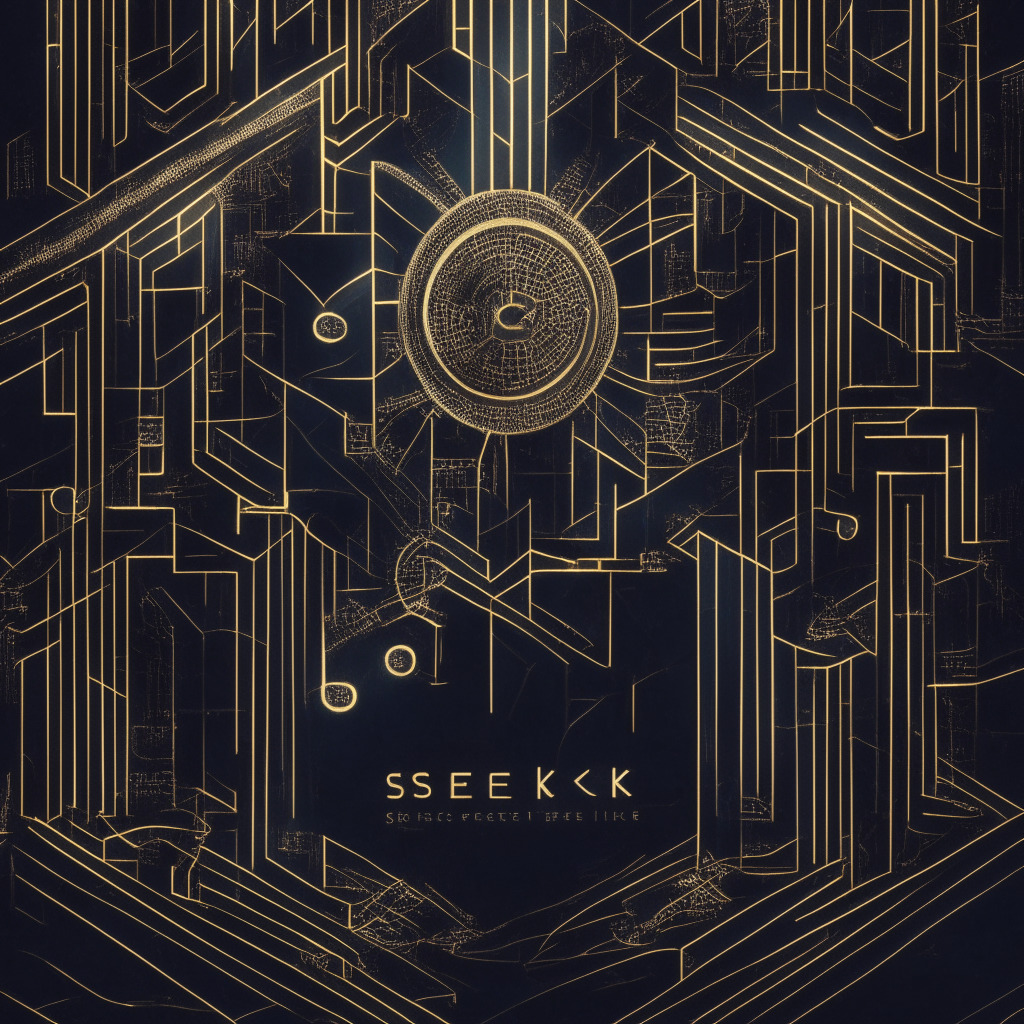Despite the closure of Algofi, a lending protocol founded on Algorand’s blockchain system, developers remain confident in Algorand’s technology. The unexpected shutdown highlights the complex dynamic between technological innovation and rigorous regulatory policy within the crypto landscape, emphasizing the unpredictability of the evolved financial system.
Search Results for: Algorand
Algorand’s Upgrade Showdown: Increased Efficiency vs. Potential Risks
Algorand’s proof-of-stake blockchain recently introduced a significant protocol upgrade aimed at speeding up transactions and improving application development efficiency. The most notable enhancement is the block time reduction from 3.8 to 3.3 seconds, fostering competitiveness and user confidence in this ever-evolving space.
Eco-friendly Algorand vs Security Concerns: Balancing the Blockchain Future
The future of cryptocurrencies is leaning towards sustainable blockchains like Algorand, which utilizes an eco-friendly pure proof of stake protocol. While this method lowers energy consumption, critics argue it might compromise security and decentralization—highlighting the challenge of finding a balance between sustainability and other crucial aspects of blockchain technology.
Achieving Finality in Blockchain: Irrevocable Transactions, Challenges and Future Prospects
“Finality in blockchain refers to the irrevocable confirmation of a transaction or block of transactions. Achieving finality has challenges like network latency and potential 51% attacks. However, improved security algorithms, consensus algorithms and advanced cryptographic techniques promise faster, more reliable confirmations, and permanence of transactions.”
Leased Proof-of-Stake: Game-Changer or Just Another Player in Blockchain Technology?
“Blockchain technology introduces Leased Proof-of-Stake (LPoS), an innovative mechanism aimed at overcoming crypto mining complications. LPoS allows tokenholders to lease their tokens to validator nodes, improving their chance at generating new blocks and sharing transaction fees. While offering benefits such as decentralization and fixed tokens, LPoS also maintains control by restricting trade or transfer of leased tokens.”
Bankrupt Celsius To Undergo Leadership Change: A Ray of Hope or A Path to Uncertainty?
Former Algorand CEO, Steve Kokinos, is set to take over the bankrupt crypto lender, Celsius, under an unnamed Delaware corporation, following Celsius’ bankruptcy filing during a 2022 crypto market crash. The transition could lead to partial recovery of stakeholders’ assets, creating an uncertain future for Celsius amidst a former CEO’s fraud charges and an upcoming approval vote.
BlockFi Bankruptcy: Proposed Stablecoin Switch for Trade-Only Wallets and Legal Scuffles
Bankrupt crypto lender BlockFi has requested court approval to convert “trade-only” wallet assets into stablecoins for withdrawal. Accounting for less than half a percent of all BlockFi user wallets in the U.S., these include diverse digital currencies such as Bitcoin Cash, Algorand and Dogecoin. BlockFi aims to facilitate a comprehensive withdrawal process through this method.
BlockFi’s Redemption Saga: From ‘Trade Only’ Assets to Gemini Dollars and Patricia’s PTK Crisis
BlockFi’s saga continues as the company seeks court authorization to convert ‘trade only’ assets into stablecoins for user withdrawal. This move, supported by the Committee of BlockFi creditors, is part of efforts to return user funds. However, uncertainty remains due to debt and questionable plans. Similarly, Patricia crypto exchange faces skepticism over its debt token, Patricia Token (PTK). These situations highlight tension between trust, regulation, and innovation in the crypto world.
Grayscale’s Legal Victory Spurs Bitcoin Surge and Highlights Crypto’s Regulatory Challenges
“Yesterday’s Bitcoin surge was a reaction to the ruling in favor of Grayscale against the SEC, seen as a win for the broader crypto industry. Cryptocurrencies like XDC Network, Wall Street Memes, Avalanche, yPredict, and Algorand emerged as strong candidates in light of this regulatory development. However, approval for the first U.S. Bitcoin ETF is still needed, indicating ongoing regulatory challenges.”
Spot Bitcoin ETF Approval: Revolution for Wall Street or Maze of Doubts?
“The anticipated approval of spot Bitcoin ETF applications by the SEC from BlackRock and Invesco could revolutionize Wall Street, allowing institutional engagements with cryptocurrencies. However, competition and navigation through the complex world of digital wallets and cryptocurrencies may hinder clear-cut victories.”
Unmoved Bitcoin ushers Attention to Emerging Altcoins: Exploring potentials and Pitfalls
PayPal launched its own stablecoin, PayPal USD (PYUSD), yet Bitcoin’s price remains steady. Potential crypto market outliers like XDC Network, Wall Street Memes Token, Kaspa, XRP20, and Algorand are gaining attention due to their sturdy fundamentals and promising technical analysis. Still, as the crypto market’s unpredictable nature is undeniable, investors should proceed with caution.
SEC and Crypto ETFs: A Future Game-Changer in Cryptocurrency Markets?
The SEC has invited public comments on a Bitcoin ETF proposition, ahead of the Federal Open Market Committee meeting in July. Amidst such events, Bitcoin maintains stability in the $30,000 support area. Applications for Bitcoin ETFs are being evaluated positively by the market, with public opinion eagerly awaited by the SEC.
Exploring the Booming Use of ZK-Rollups and the Ongoing Shifts in the Crypto Domain
The increasing implementation of ‘Zero-knowledge rollups’ or ZK-rollups has remarkably grown in the Ethereum ecosystem. However, the DeFi domain needs better security optimization, with variegated results from bug bounty programs. Major breaches have been reported on the Multichain protocol despite bug detection strategies.
SEC Lawsuits Impact on Crypto: Analyzing Losses and Market Resilience
The SEC recently filed lawsuits against Binance and Coinbase, accusing them of selling unregistered securities and causing significant losses for various cryptocurrencies. The affected tokens lost 15%, or $5 billion, from their market capitalizations, impacting not only the accused projects but also emerging market tokens not implicated in the lawsuit. Despite these losses, the crypto market has shown resilience with a recent bullish rally.
Crypto Lender Hodlnaut’s Fate: Dissolution or Restructuring, What Lies Ahead?
A Singapore court will soon decide the fate of crypto lender Hodlnaut, which faces potential dissolution following massive losses of $317 million. The company’s downfall highlights growing concern over the stability and safety of the crypto lending industry and emphasizes the need for robust regulation and oversight.
EDX Markets Launch: The Pros, Cons, and Main Conflicts in the Crypto Sphere
EDX Markets, a new crypto exchange backed by Citadel Securities, Fidelity Investments, and Charles Schwab, offers trading for major cryptocurrencies without storing the digital assets themselves. Meanwhile, regulatory concerns and security risks emphasize the importance of vigilance and due diligence in the crypto space.
Tether and Kava Partnership: Stablecoin Expansion Amid Reserve Concerns
Tether plans to launch USDT tokens on Kava, a scalable layer-1 blockchain, providing Kava’s community access to the dependable stablecoin. Despite concerns about USDT’s stability and reserves, this partnership strengthens Tether’s position as a market-leading stablecoin.
BlackRock’s ETF Filing Resuscitates Bitcoin: Market Optimism vs Investor Caution
Bitcoin surpassed $26,000, marking its highest level in a week, following BlackRock’s recent filing for a spot bitcoin ETF. Other cryptocurrencies like Ether, SOL, ADA, MATIC, and ALGO also experienced a boost. The market’s recovery highlights the influential power of major financial institutions on the crypto market despite regulatory and inflation concerns.
Delisting ADA, SOL, and MATIC: Balancing Regulatory Compliance and Crypto Innovation
Bakkt Inc delists Cardano, Solana, and Polygon following their designation as investment contracts by the SEC. This move aims to ensure compliance with regulatory guidelines, but may hinder the growth potential of affected digital currencies and the broader crypto industry.
eToro Delists Crypto Tokens Amid SEC Actions: Balancing Regulation and Innovation
eToro delists crypto tokens for U.S. customers from July 12 due to recent SEC legal actions against crypto exchanges. The crypto market faces regulatory pressures and market fluctuations, requiring a balance between fostering innovation and ensuring investor protection.
eToro’s Delisting Dilemma: Balancing Crypto Growth with Regulatory Compliance
Crypto trading platform eToro will delist tokens like Algorand and Polygon for US customers due to recent SEC legal action against crypto exchanges. Increased regulation raises questions about the future of cryptocurrencies, balancing consumer protection and market validation with potential stifling of innovation.
SEC Crackdown on Crypto: eToro Restrictions, Binance Lawsuit, and XRP’s Future Debate
eToro US restricts trading in Algorand, Decentraland, Dash, and Polygon due to SEC classification as securities. The platform continues supporting cryptoassets, while working with regulators to shape the future of the crypto industry and ensure investor access.
eToro and Robinhood Limit Crypto Offerings: Impact on Market and Regulatory Challenges
eToro announced its U.S. customers will no longer be able to purchase Algorand, Decentraland, Dash, and Polygon starting next month due to the SEC’s increased regulatory oversight. The rapidly evolving regulatory landscape has also led Robinhood to stop supporting Cardano, Solana, and Polygon for U.S. customers. Both platforms highlight the challenge between innovation and regulation in the crypto landscape.
Bitcoin Stability Amid SEC Crackdown: How Altcoins Suffer & Future Market Implications
Amid the SEC’s crackdown on the crypto market, Bitcoin exhibits commendable stability, maintaining support above $25,000 and its market share approaching 50%. However, altcoins experience instability, with SEC allegations implicating tokens like Solana, Polygon, and Algorand.
SEC’s Labels Impact ALGO and FLOW: Analyzing Market Reaction and Crypto Resistance
The SEC’s decision to label several cryptocurrencies as securities resulted in historic lows for Algorand (ALGO) and Flow (FLOW) on June 10. Despite opposition from projects like Solana, Cardano, and Polygon, the crypto market thrives, but ongoing debates may create volatility for investors.
SEC Allegations Against Exchanges: A Chilling Effect on DeFi’s Future and Innovation
The SEC’s allegations against Binance and Coinbase challenge the future of DeFi, potentially hindering innovation and disrupting the ecosystem. By targeting these exchanges for suspected securities law violations, regulators threaten DeFi’s decentralized nature and may dampen investor confidence, limiting market growth and long-term potential.
SEC Pressure on Crypto Exchanges: eToro and Robinhood’s Compliance Commitment
As the SEC increases regulatory pressure on cryptocurrency exchanges like Binance and Coinbase, major platforms, including eToro, emphasize their commitment to compliance and collaboration with regulators. This ensures access to a variety of asset classes for investors, shaping the crypto industry’s future while promoting investor protection and fostering innovation and growth.
Impact of SEC Lawsuits on Crypto Market: Analyzing Volatility and Affected Tokens
The SEC lawsuits against Coinbase and Binance have impacted crypto markets, causing certain tokens like SAND, ALGO, ADA, BNB, FIL, MATIC, CHZ, ATOM, and ICP to drop 10-18% in value. Skepticism surrounds the SEC’s reasoning, with claims of technical misunderstandings. Traders should tread cautiously with affected tokens as market fluctuations persist.
SEC Lawsuits Impact Crypto Prices: Untangling Regulatory Complexities in the US Market
Major cryptocurrencies face sharp declines due to U.S. SEC lawsuits against Binance and Coinbase, while Bitcoin remains a relative safe haven. As the cryptocurrency market navigates a complex regulatory landscape, the future of the industry and its stakeholders hangs in the balance.
SEC Chair’s Tweet Controversy: Gensler, Coinbase Lawsuit, and Crypto Community’s Call for Clarity
A recent tweet by US SEC Chair Gary Gensler addressing the ongoing Coinbase lawsuit omitted crucial context. Twitter fact-checkers added community notes emphasizing that Coinbase had sued the SEC seeking clear guidelines on issues Gensler accused them of failing. This highlights the need for transparent regulations in the rapidly evolving crypto world.
SEC’s Cryptocurrency Securities Criteria: Uncertainty and its Impact on the Industry
The US SEC’s recent lawsuits against Binance and Coinbase have raised concerns about criteria used to determine which cryptocurrencies are considered securities. Market capitalization of these “crypto securities” exceeds $100 billion, yet clear regulations are lacking, leading to uncertainty about the future of crypto in the United States.
Regulatory Rumble: Gensler’s Alleged Binance Ties and the SEC Lawsuit’s Legitimacy Debate
SEC Chair Gary Gensler allegedly offered to advise Binance, the crypto exchange he is currently suing. Documents reveal Gensler engaged in conversations with Binance in 2019, which could present a conflict of interest in the ongoing lawsuit. Investors should conduct their own research before making financial decisions.































